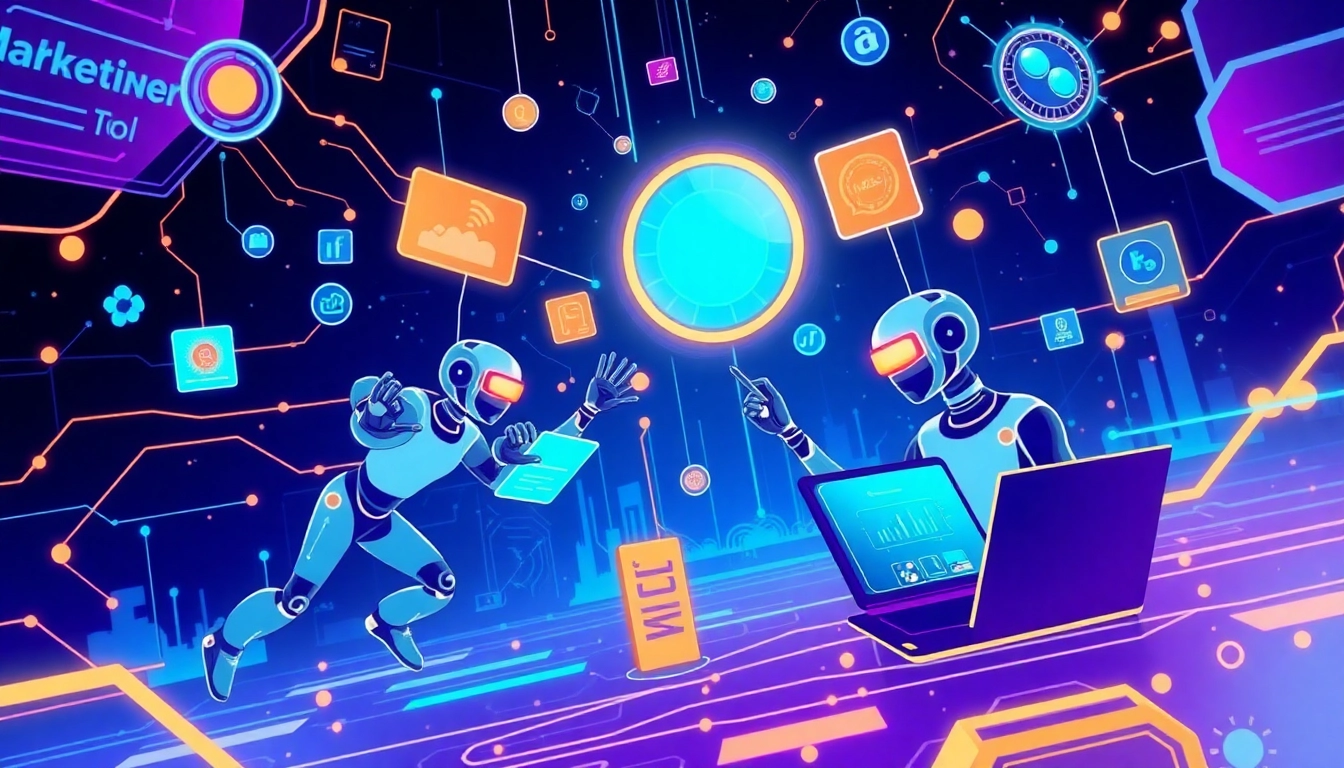Understanding AI Marketing Agents
Artificial Intelligence (AI) has redefined numerous industries, and marketing is no exception. In this era of digital transformation, AI marketing agents are emerging as critical tools designed to automate marketing tasks, optimize campaign efforts, and enhance customer experience. These software tools are engineered to perform specific marketing functions using machine learning, predictive analytics, and data interpretations, allowing marketers to focus on strategic planning and creative tasks.
Definition and Core Functions
AI marketing agents can be defined as sophisticated software systems that leverage artificial intelligence to automate repetitive marketing tasks and processes. These agents often operate autonomously or semi-autonomously, depending on their programming and the complexity of the tasks at hand. Common functions include:
- Customer Segmentation: AI tools can analyze large datasets to identify distinct customer segments based on behavior, preferences, and demographics, allowing for targeted marketing strategies.
- Personalized Content Delivery: By analyzing user data and engagement patterns, AI agents can deliver tailored content across channels, enhancing user experience and engagement.
- Campaign Optimization: AI monitors campaign performance in real-time, providing actionable insights that help marketers make data-driven adjustments for improved outcomes.
How AI Enhances Marketing Tasks
AI marketing agents enhance traditional marketing methods by automating tedious tasks and offering predictive insights. Automation saves time and reduces the risk of human error while predictive analytics enables marketers to anticipate customer behavior and trends. For example, AI can analyze social media engagements to forecast which types of content will perform best, allowing marketers to optimize their content strategy proactively.
The Role of Human Oversight
While AI marketing agents bring efficiency and data-driven insights, human oversight remains crucial. Marketers must ensure that AI systems operate within ethical boundaries and align with brand values. Furthermore, human creativity is irreplaceable in crafting compelling narratives and strategies that resonate with audiences. Therefore, the synergy between AI capabilities and human intuition is vital for effective marketing campaigns.
Benefits of Implementing AI Marketing Agents
Implementing AI marketing agents offers numerous benefits that can significantly improve marketing efforts and expand business reach. Organizations are increasingly adopting these agents to remain competitive in a rapidly evolving digital landscape.
Improving Customer Targeting
AI marketing agents excel at analyzing vast datasets quickly, identifying patterns and trends that would be unmanageable manually. This capability vastly improves customer targeting by enabling marketers to engage with their audiences more effectively. For example, AI can analyze customer purchase history and online behavior to segment audiences accurately, allowing for tailored marketing messages that resonate deeply with specific groups.
Enhancing Content Personalization
The personalization of content is increasingly vital for customer engagement. AI marketing agents utilize data collected from various sources—such as website interactions and social media behaviors—to customize content delivery. For instance, AI can recommend products based on past purchases, provide relevant articles based on reading history, or suggest services based on customer inquiries, ultimately enhancing user satisfaction and driving conversions.
Streamlining Campaign Optimization
With AI agents in place, marketers can continuously optimize campaigns. These agents analyze real-time data on campaign performance and suggest improvements. For example, if an AI tool detects that a particular ad series is underperforming, it can recommend adjustments to the ad copy, target audience, or distribution channels. This adaptability allows marketers to respond swiftly to changing consumer behavior and market conditions, ensuring campaigns maintain peak performance.
Leading AI Marketing Agents in the Market
Several AI marketing agents have gained prominence in the industry, each offering unique features suited to various marketing needs. Understanding the landscape of these tools is essential for businesses looking to implement AI solutions effectively.
Top Tools and Platforms Available
Some of the most recognized AI marketing tools include:
- HubSpot: A comprehensive inbound marketing tool that integrates AI for lead generation, content optimization, and customer engagement analytics.
- Salesforce Einstein: Part of the Salesforce ecosystem, Einstein leverages AI to enhance customer relationship management (CRM), personalizing interactions and optimizing sales processes.
- AdRoll: This platform utilizes AI for retargeting strategies, helping marketers recover potential lost customers through personalized ad experiences based on previous interactions.
- Marketo: Offered by Adobe, Marketo employs AI to streamline marketing automation, dashboard analytics, and lead nurturing processes.
Comparative Analysis of Services
When considering various AI marketing agents, it’s crucial to analyze the services they provide. A comparative examination can uncover which tool aligns best with specific marketing goals. For instance, while HubSpot excels in inbound marketing and holistic CRM features, AdRoll shines in retargeting and personalized advertising efforts. Moreover, pricing structures, integrations, and user-friendliness are important parameters to evaluate.
Choosing the Right Agent for Your Business
Choosing the appropriate AI marketing agent calls for a meticulous assessment of organizational needs, budget, and the marketing landscape. Here are some essential steps to guide the process:
- Define Objectives: Clearly outline what you aim to achieve with AI marketing. Is it increased lead generation, customer retention, or brand awareness?
- Evaluate Market Tools: Research different AI marketing platforms and their features, ensuring they align with your defined objectives.
- Assess Integration Capabilities: Ensure that the selected AI tool can seamlessly integrate with your existing systems and workflows.
- Consider Customer Support: Effective customer service can make a significant difference, especially during implementation and troubleshooting.
Challenges and Considerations
While AI marketing agents offer substantial benefits, several challenges and considerations need to be addressed for successful implementation.
Addressing Data Privacy Concerns
The use of AI necessitates the collection and analysis of vast amounts of personal data, which raises substantial privacy concerns. Marketers must ensure compliance with regulations such as GDPR and CCPA, which dictate how consumer data can be collected and utilized. Transparent data practices and robust security protocols are vital to maintaining consumer trust and avoiding legal ramifications.
Balancing Automation and Human Interaction
Finding the right balance between automation and personal touch in customer interactions is crucial. Over-reliance on AI can lead to customer experiences that feel impersonal, while too much human involvement can negate efficiency gains. Businesses should implement AI in a way that augments human efforts rather than replacing them, focusing on enhancing the customer journey through automated efficiency and human empathy.
Staying Updated with AI Developments
The AI landscape is rapidly evolving, making it necessary for organizations to stay informed about the latest advancements and trends. Marketing teams should prioritize ongoing training and professional development to adapt to new technologies effectively. Embracing continuous learning fosters innovation and helps organizations stay ahead of the competition.
The Future of Marketing with AI Agents
As we move forward, the influence of AI marketing agents on business strategy will undoubtedly deepen. Keeping an eye on future trends will provide marketers with the tools necessary to stay competitive.
Predictive Trends and Innovations
Several key trends are likely to shape the future of AI in marketing:
- Hyper-Personalization: The ability to tailor messages in real-time using AI-enhanced data analytics will become the norm, significantly improving user engagement rates.
- Improved Predictive Analytics: AI systems will leverage deeper machine learning capabilities, allowing for highly accurate forecasting in customer behavior and market trends.
- Integrative Multi-Channel Marketing: Future marketing agents will facilitate seamless experiences across various platforms, ensuring consistency in branding and customer engagement.
Preparing for an AI-Driven Market
Businesses should prepare for an increasingly AI-driven market by investing in technology and developing a culture of innovation. Establishing collaborations with AI development firms and frequently testing new tools can help keep your organization on the cutting edge. Additionally, developing a skilled workforce that embraces and understands AI will be essential in navigating this dynamic landscape.
Strategies for Long-term Success
For organizations to succeed in leveraging AI marketing agents effectively over the long term, the following strategies should be considered:
- Focus on Data Quality: Ensure that the data used by AI systems is of the highest quality, as the effectiveness of AI is directly dependent on the quality of data utilized.
- Build a Cross-Functional Team: Encourage collaboration across departments—marketing, IT, sales, and customer service—to enhance the successful integration of AI solutions.
- Measure ROI: Continuously assess the performance of AI marketing agents by measuring their return on investment to refine strategies and emphasize areas for improvement.



